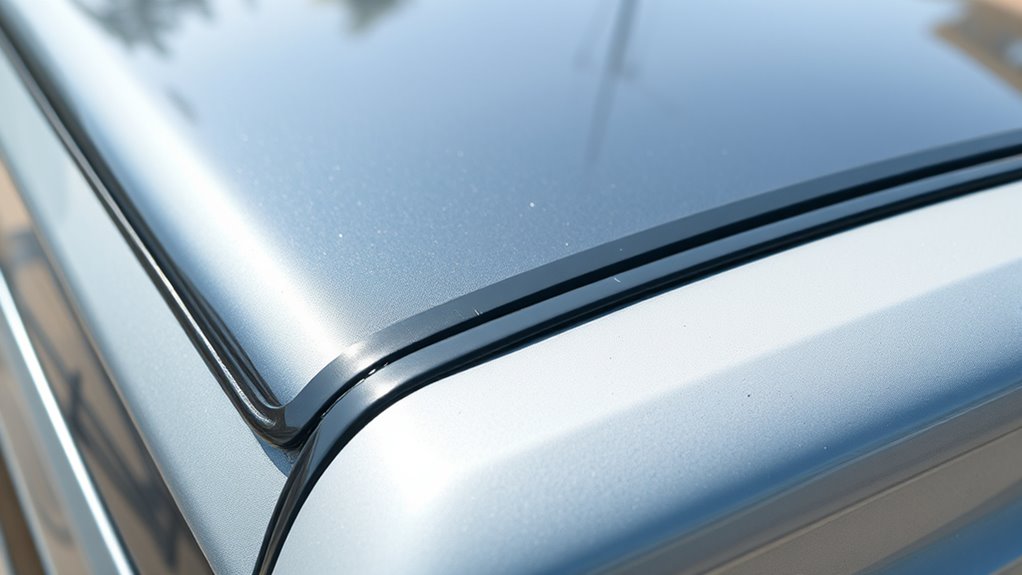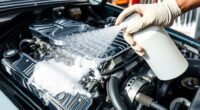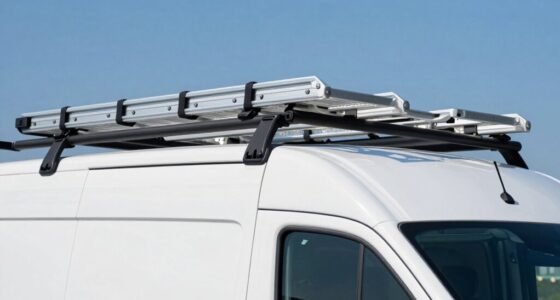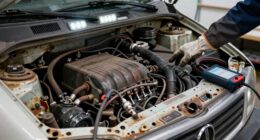If you’re looking for the best sealants to keep your van roof dry and secure, I recommend options like EternaBond RoofSeal tape for a waterproof, long-lasting bond, and Kohree’s self-leveling sealant for flexibility and ease of application. Dicor’s non-leveling sealant works well on vents and edges, while Titebond offers durable roofing solutions for metal surfaces. Keep an eye out for products that resist UV rays, weather, and extreme temps—if you want to learn more, I’ve got the details for you.
Key Takeaways
- Choose durable, weatherproof sealants like EternaBond RoofSeal or Titebond for long-term protection against moisture and UV damage.
- Opt for flexible, easy-to-apply options such as Kohree RV Sealant Tape or Kohree Self-Leveling Sealant for seamless, airtight seals.
- Ensure compatibility with your van’s roof material, including EPDM, TPO, PVC, or metal, for effective bonding and sealing.
- Prioritize sealants that resist cracking, shrinking, and temperature fluctuations to maintain a secure, waterproof seal over time.
- Consider application ease, surface prep requirements, and cost-effectiveness to find the best sealant for your van roof installation needs.
EternaBond RoofSeal White 4×50 MicroSealant RV Roof Seal Tape
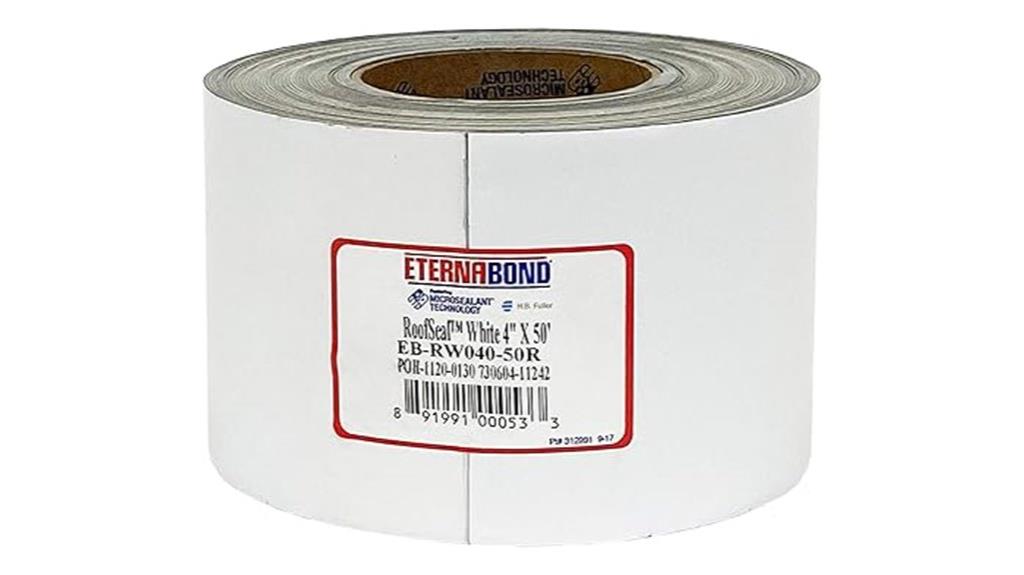
If you’re looking for a reliable and long-lasting sealant for van roof installations, the EternaBond RoofSeal White 4×50 MicroSealant RV Roof Seal Tape is an excellent choice. I’ve used it on RV roofs, trailers, and other surfaces, and it’s impressive how durable and waterproof it is. The tape’s 35 mil thickness, combined with advanced MicroSealant, creates a flexible, airtight barrier that bonds to various materials like metal, fiberglass, and EPDM. It withstands UV rays, temperature changes, and harsh weather, ensuring long-term protection. Its easy application—peel, stick, and roll—makes sealing quick and secure, giving me confidence that my van stays dry and leak-free.
Best For: DIY enthusiasts and RV owners seeking a durable, waterproof sealant for roof repairs, leaks, and sealing joints on various surfaces.
Pros:
- Provides a strong, permanent, waterproof, and airtight seal that withstands UV rays and temperature fluctuations
- Easy to apply with peel-and-stick method, requiring only rolling for optimal adhesion
- Bonds to a wide range of materials including metal, fiberglass, EPDM, TPO, and more, ensuring versatility
Cons:
- Once applied, the tape is difficult to reposition or remove, requiring careful placement initially
- Proper surface prep is essential; inadequate cleaning can compromise adhesion
- Application on bumpy or uneven surfaces may be challenging, requiring firm pressing and use of a roller
Kohree RV Roof Sealant 2 Pack, Self-Leveling Lap Sealant White
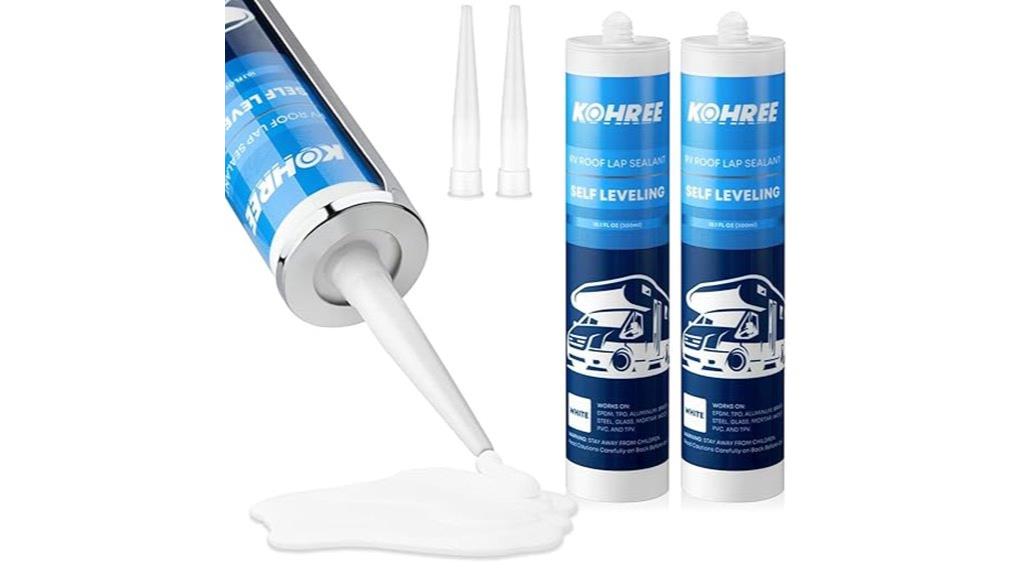
The Kohree RV Roof Sealant 2 Pack is an excellent choice for anyone seeking a reliable, easy-to-apply sealant that forms a smooth, flat surface quickly. Its self-leveling feature ensures it spreads evenly within 30 seconds, sealing gaps on various surfaces like EPDM, TPO, PVC, and metal. It offers strong adhesion, waterproofing, and elasticity, preventing leaks and cracks. Plus, it withstands extreme temperatures from -40°F to 200°F, remains flexible, breathable, and durable over time. The low-odor, safe formula makes it easy to use indoors or outdoors, and the 2-pack is perfect for small to medium repairs, ensuring long-lasting protection.
Best For: RV owners and maintenance professionals seeking a durable, easy-to-apply sealant for roof repairs and sealing gaps on various surfaces.
Pros:
- Self-leveling design ensures quick, smooth application within 30 seconds.
- Strong adhesion and waterproofing capabilities prevent leaks and cracks effectively.
- Suitable for multiple surfaces including EPDM, TPO, PVC, and metal, offering versatile use.
Cons:
- Slightly thinner consistency may require careful application to avoid runs.
- May need multiple packs for extensive or large-area repairs.
- Some users find it a bit runny compared to traditional thicker sealants.
Kohree RV Sealant Tape for Roof and Waterproof Sealing
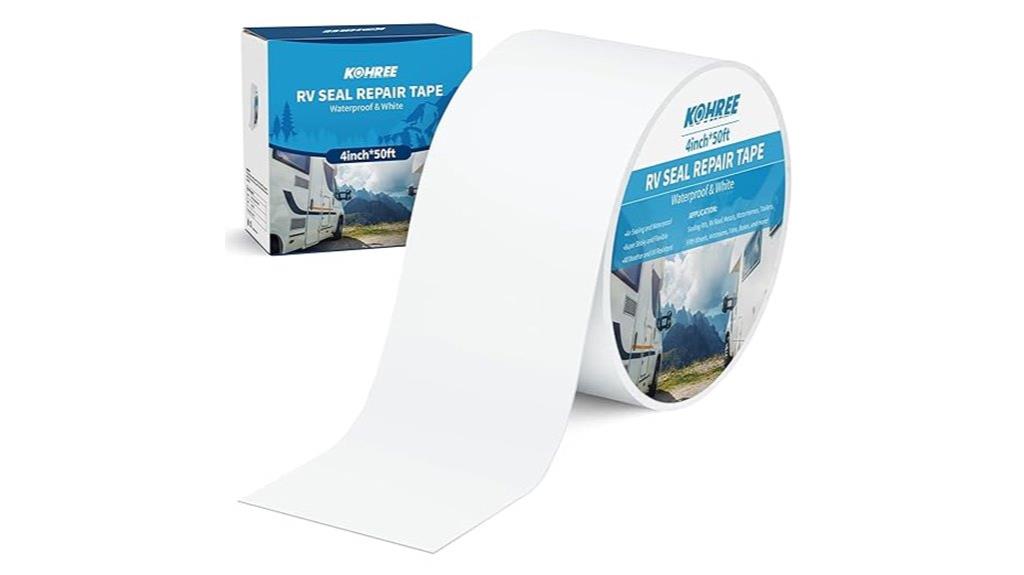
Kohree RV Sealant Tape is an excellent choice for anyone looking to quickly and reliably seal their RV roof or waterproof vulnerable areas. Measuring 4 inches by 50 feet, it works on various surfaces like metal, EPDM, PVC, Hypalon, and TPO, making it highly versatile. Its waterproof, UV-resistant, and weatherproof properties guarantee it withstands moisture, UV rays, and harsh elements. The tape’s strong adhesion and flexibility allow for easy application on flat, curved, or corner surfaces. Once applied, it forms a durable, long-lasting seal, preventing leaks and environmental damage. Many users praise its reliability, ease of use, and excellent value for RV waterproofing needs.
Best For: RV owners and mobile travelers seeking a reliable, waterproof sealant for roofs, windows, and doors across various surfaces to prevent leaks and withstand harsh weather conditions.
Pros:
- Strong adhesion to multiple surfaces including metal, EPDM, PVC, Hypalon, and TPO.
- Waterproof, UV-resistant, and weatherproof, ensuring long-lasting protection.
- Easy to apply with flexible, self-priming features suitable for flat, curved, or corner surfaces.
Cons:
- May be difficult to remove once fully adhered, limiting reusability.
- Initial adhesion can be challenging in windy conditions during application.
- Long-term durability may vary depending on environmental exposure and surface preparation.
Dicor 551LSW-1 HAPS-Free NON-Leveling Lap Sealant

For RV owners seeking a reliable, long-lasting sealant, Dicor 551LSW-1 HAPS-Free NON-Leveling Lap Sealant stands out due to its excellent adhesion and flexibility. It’s designed for RV roofing, especially EPDM, but works well on various materials like aluminum, vinyl, and concrete. Its self-leveling feature creates a smooth finish, and it resists discoloration and staining over time. I find it easy to apply, especially when warmed outside, and it adheres strongly to old and new sealant. While a bit pricey, its durability and quick drying make it a smart choice for sealing roof edges, vents, and screw holes effectively.
Best For: RV owners seeking a durable, flexible sealant for roof repairs, especially on EPDM and other roofing materials, that provides long-lasting waterproofing and easy application.
Pros:
- Excellent adhesion to diverse substrates including old sealant, aluminum, vinyl, and concrete
- Self-leveling for a smooth, professional finish with enhanced appearance
- Resists discoloration, staining, and maintains flexibility over time
Cons:
- Slightly expensive compared to other sealants
- May require warming and multiple applications for larger projects
- Does not spread as far as some users expect, necessitating extra tubes for extensive sealing
Titebond 61121 Metal Roof Sealant Cartridge, 10.1 oz., Black

If you’re sealing van roof installations, Titebond 61121 Metal Roof Sealant Cartridge is an excellent choice because it offers strong, waterproof adhesion to a variety of roofing materials. This high-performance sealant bonds well to metals like aluminum, steel, and galvanized surfaces, as well as plastics, glass, wood, masonry, and PVC. It creates a weather-tight barrier against water, wind, dust, and dirt, ensuring durability in extreme conditions. With a full cure time of about seven days, it remains pliable, flexible, and UV-resistant. Its black color matches roofing elements seamlessly, making it a reliable, long-lasting solution for sealing seams, flashing, and roof penetrations.
Best For: DIY homeowners and professional contractors sealing metal roofs, flashing, and penetrations in extreme weather conditions for long-lasting waterproof protection.
Pros:
- Excellent adhesion to a variety of roofing materials including metals, plastics, and masonry
- Remains flexible and pliable after curing, accommodating building movement
- UV-resistant and weatherproof, ensuring durability over time
Cons:
- Full cure time of approximately 7 days may delay final project completion
- Size of the cartridge (10.1 oz.) might require multiple applications for large projects
- Some users may find the black color less suitable for lighter-colored roofing or aesthetic preferences
RV Roof Coating Sealant for Campers and Motorhomes
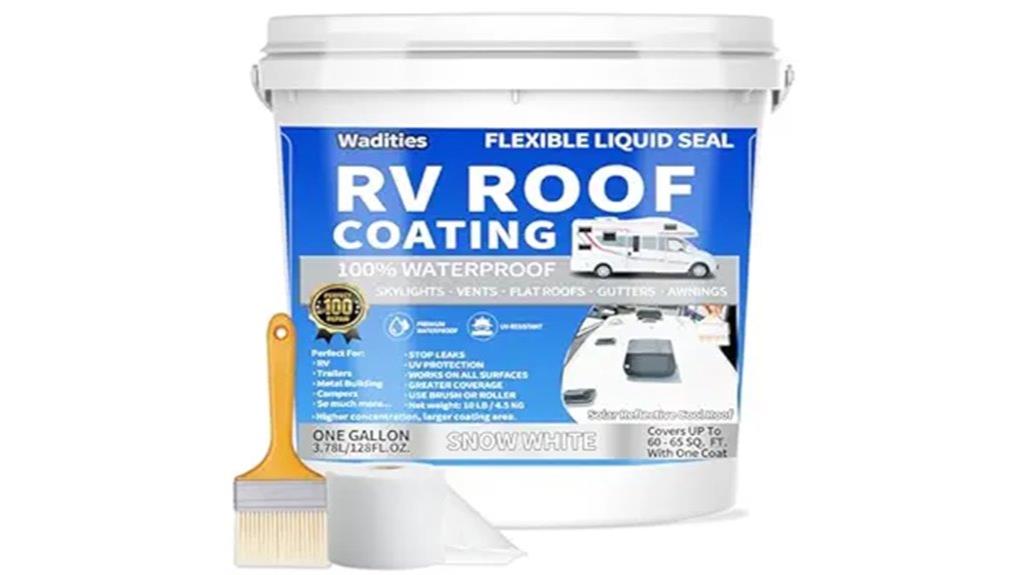
When sealing the roof of your RV or camper, choosing a coating that offers exceptional flexibility and UV resistance is essential to prevent cracks and sun damage over time. Wadities RV Roof Coating is designed for this purpose, providing a waterproof, solar-reflective sealant that’s easy to apply and highly durable. It boasts 1000% flexibility, which helps it resist cracking from roof movement, and UV stability to prevent sun degradation. With a high solid concentration, it creates a strong, waterproof membrane. Suitable for indoor and outdoor use, it’s safe for humans and pets, and a few coats can effectively repair leaks and extend your roof’s lifespan.
Best For: RV owners and campers seeking a flexible, UV-resistant, waterproof roof coating to repair leaks and extend the lifespan of their roofs.
Pros:
- Easy to apply with brush, roller, or sprayer, similar to painting
- Highly flexible (1000%) to prevent cracking from roof movement
- UV resistant and stable, protecting against sun degradation and sun damage
Cons:
- Requires multiple coats (often 3+) for optimal sealing and bright white finish
- Can be messy to apply and difficult to reseal leftover material
- Price may be high for larger projects and thick consistency demands careful application
Liquid Rubber RV Roof Sealant, White, 1 Gallon

Liquid Rubber RV Roof Sealant in white, 1 gallon, stands out as an ideal choice for DIY enthusiasts and professional installers seeking a durable, flexible, waterproof coating. It creates an elastic membrane that prevents leaks and water damage while maintaining flexibility across temperature changes. Its solar-reflective properties help reduce heat absorption, lowering interior temperatures and energy costs. Suitable for various surfaces like EPDM, TPO, fiberglass, and aluminum, it pairs well with Liquid Rubber primers for better adhesion. Easy to apply with brushes, rollers, or sprayers, this water-based, zero VOC formula provides long-lasting protection—up to 10 years—making it a reliable solution for RV roof maintenance.
Best For: DIY homeowners and professional RV maintenance crews seeking a long-lasting, waterproof, and energy-efficient roof sealant.
Pros:
- Highly flexible and elastic, preventing cracks and leaks over time
- Easy to apply with brushes, rollers, or sprayers, suitable for various surfaces
- Provides solar reflectivity to reduce interior temperatures and energy costs
Cons:
- Requires proper surface preparation and multiple coats for optimal durability
- Coverage is approximately 50 sq ft per gallon, which may necessitate multiple pails for large projects
- Application is limited to temperatures between 50°F-90°F, restricting outdoor work in colder climates
GEOCEL GC55103 4500 Roof Bonding Sealant, 10 Ounce Cartridge, Black
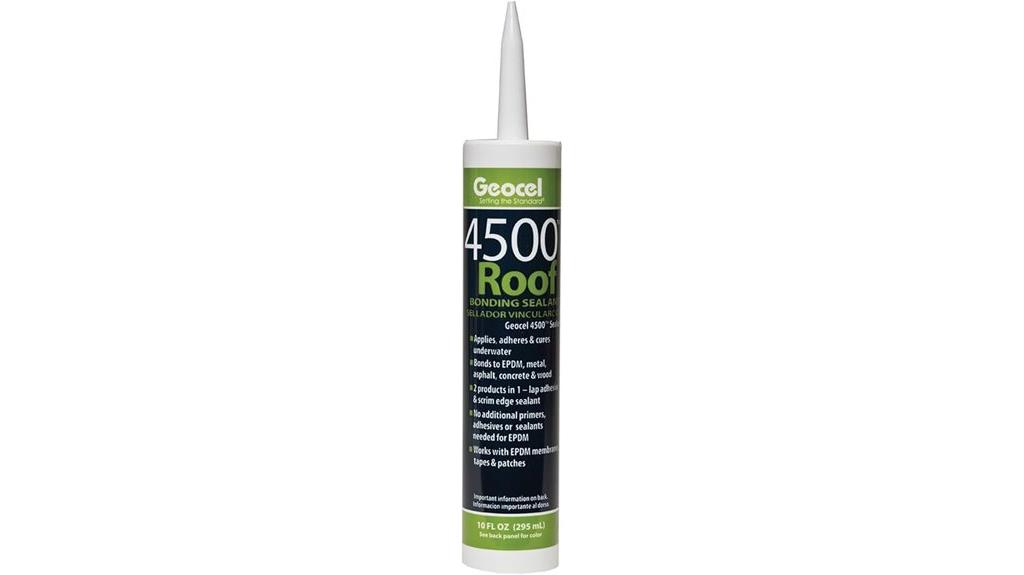
Looking for a reliable sealant that can bond effectively even in wet conditions? The GEOCEL GC55103 4500 Roof Bonding Sealant is a top choice. It’s a single-component Scypolymer formula that adheres and cures underwater, making it perfect for roof repairs on various materials like asphalt shingles, steel, and EPDM. Its black liquid form is easy to apply, and it forms a durable, flexible bond resistant to ponding water, wind, and weather. I’ve used it for sealing roof penetrations and reattaching shingles, and it holds up well after heavy rain and storms. This product’s quick bonding and waterproof qualities make it a reliable, versatile solution for van roof installations.
Best For: DIY homeowners and roofing professionals seeking a waterproof, flexible sealant for roof repairs and bonding on various roofing materials even in wet conditions.
Pros:
- Excellent underwater adhesion and quick curing for fast repairs.
- Highly versatile, compatible with asphalt shingles, metal, EPDM, and more.
- Durable, weather-resistant, and flexible to withstand ponding water and storms.
Cons:
- Messy application that can be difficult to clean up once dried.
- Short shelf life after opening, requiring prompt use.
- Can harden prematurely if not used quickly, and removal of excess is challenging.
Liquid Rubber RV Roof Coating, Waterproof Sealant for Leaks & Cracks
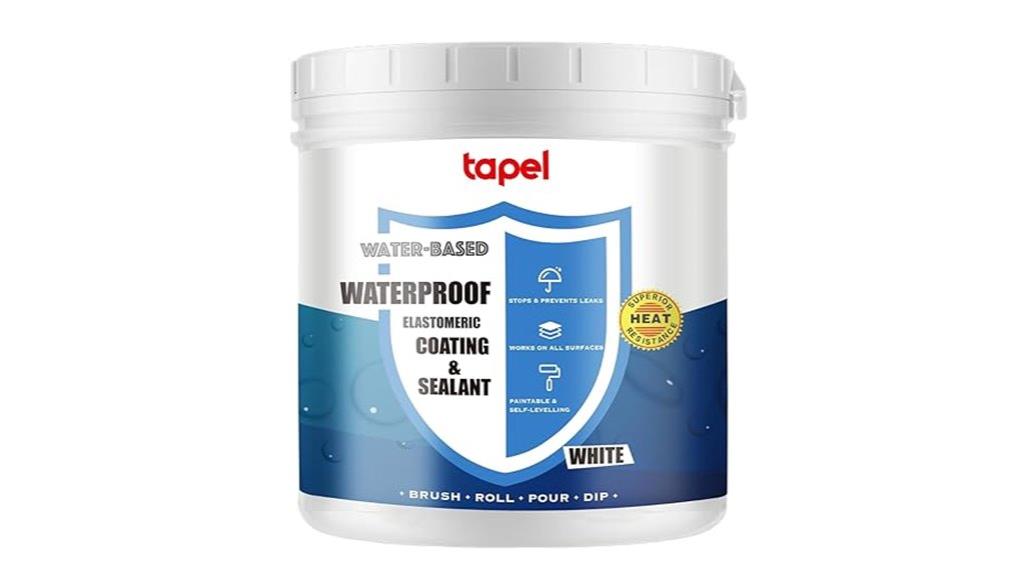
If you’re seeking a highly durable and flexible sealant for van roof repairs, Liquid Rubber RV Roof Coating stands out as an excellent choice. It’s waterproof, self-leveling, and forms a rubbery membrane that hides imperfections, making it perfect for sealing leaks and cracks. With lab-certified 11-year UV resistance, it’s designed to withstand extreme weather, from -40°F to 248°F, and offers a 300% waterproof boost, capable of stopping active leaks at 40 PSI. Easy to apply with a brush, roller, or spray, it dries quickly and provides long-lasting protection—up to 10 years when applied correctly. It’s a professional-grade solution for serious waterproofing needs.
Best For: DIY enthusiasts and professionals seeking a long-lasting, flexible waterproof sealant for van roofs, metal, concrete, or other surfaces exposed to extreme weather conditions.
Pros:
- Highly durable with lab-certified 11-year UV resistance and a 300% waterproof boost for active leak stopping
- Easy to apply via brush, roller, or spray, with a quick drying time and self-leveling, seamless finish
- Forms a flexible, elastic membrane that hides imperfections and withstands temperature ranges from -40°F to 248°F
Cons:
- Some users report uneven pigment distribution, leading to less white coverage or appearance inconsistencies
- May not adhere well to certain plastics or surfaces without proper prep, requiring multiple coats or touch-ups
- Can be more expensive than traditional coatings and may need careful application in ideal weather conditions for best results
Kohree RV Roof Sealant 2 Pack
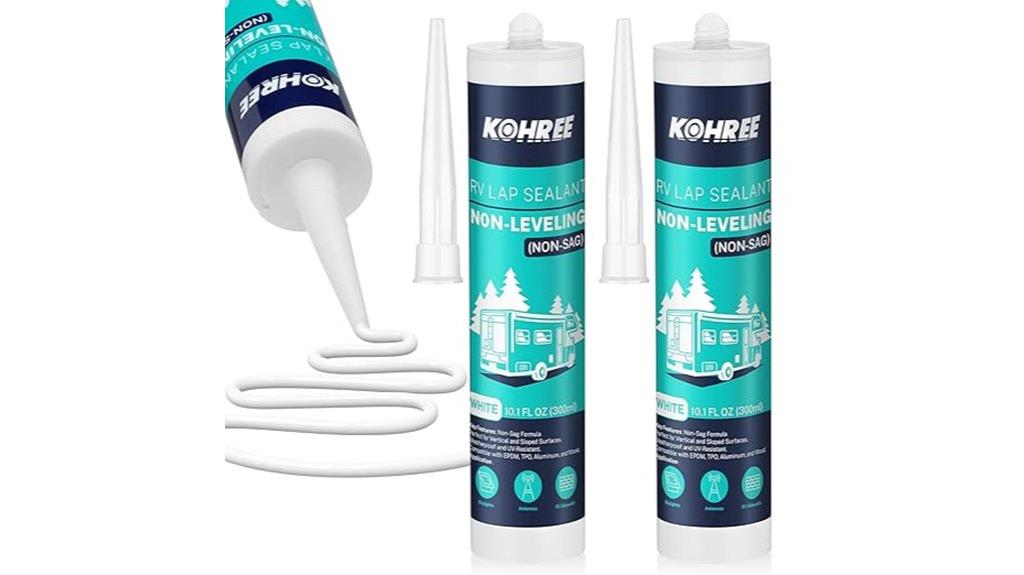
The Kohree RV Roof Sealant 2 Pack stands out as an excellent choice for those seeking a reliable, long-lasting sealant for RV roofs and vertical surfaces. It forms a waterproof, durable bond that adheres well to materials like EPDM, TPO, PVC, metal, glass, and wood. The sealant remains flexible, UV resistant, and breathable, preventing cracking or discoloration over time despite temperature changes. It’s easy to apply with no drips, dries quickly, and provides a professional, waterproof seal. Customers praise its durability, affordability, and versatility for sealing leaks, cracks, and seams on various surfaces, making it a valuable addition to any van or RV repair kit.
Best For: DIY RV owners and repair professionals seeking a durable, flexible sealant for sealing roofs, seams, and cracks on various materials including metal, vinyl, and wood.
Pros:
- Forms a strong, waterproof, and long-lasting bond with multiple surfaces
- Remains flexible and UV resistant, preventing cracking and discoloration over time
- Easy to apply with quick drying time, suitable for large or urgent repairs
Cons:
- Small print instructions can make opening and application slightly challenging for first-time users
- Requires proper surface prep (such as alcohol cleaning) for optimal adhesion
- Limited color options; primarily white, which may not match all surfaces
Dicor 501LSW-1 Self-Leveling Lap Sealant, 4 Pack
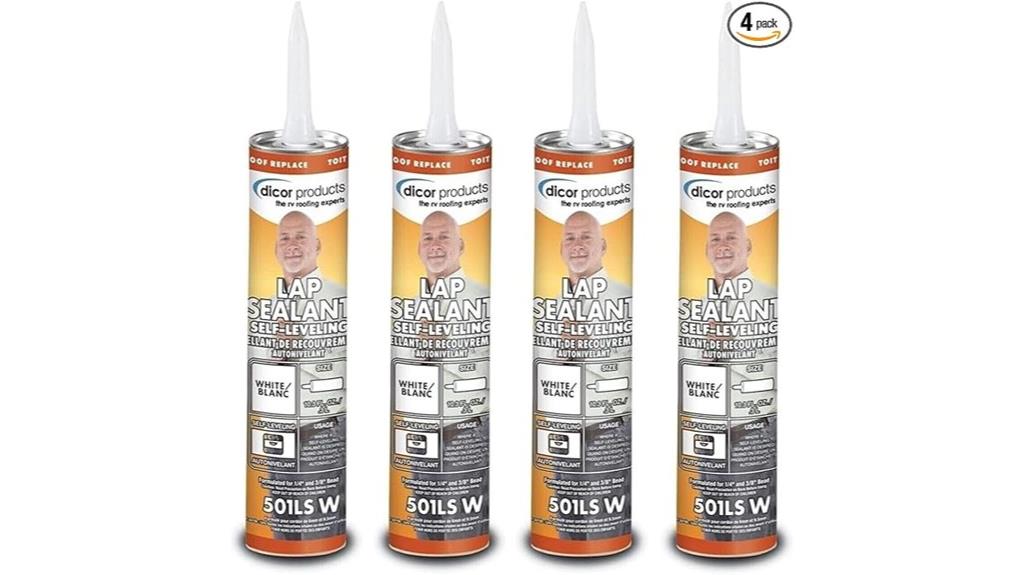
For van roof installations that require a reliable, self-leveling sealant, the Dicor 501LSW-1 4-pack stands out as a top choice. It’s designed to create a secure, long-lasting seal along roof edges, vents, and screw heads. I appreciate its versatility, as it adheres well to materials like aluminum, vinyl, fiberglass, and even EPDM or TPO sheeting. The white color blends seamlessly with most roofs, and its self-leveling properties assure a smooth application. Plus, with a shelf life of up to two years, it’s a dependable option for both immediate repairs and ongoing maintenance.
Best For: RV owners and contractors seeking a reliable, self-leveling sealant for roof edges, vents, and screw heads to ensure long-lasting waterproofing.
Pros:
- Excellent adhesion to a variety of materials including aluminum, vinyl, fiberglass, and EPDM or TPO sheeting
- Self-leveling formula provides smooth, professional application on large roof surfaces
- Long shelf life of up to two years ensures durability and value
Cons:
- Limited to white color, which may not match all roof styles or color schemes
- Requires proper surface preparation for optimal adhesion and sealing
- May need multiple applications for larger or heavily exposed areas
Kohree RV Roof Sealant 1 Pack

Kohree RV Roof Sealant 1 Pack stands out as an excellent choice for those seeking a reliable, easy-to-apply sealant that works across multiple materials. Its self-leveling design forms a smooth, flat surface within 30 seconds, effectively sealing gaps and cracks. The white color matches typical RV sealants, and its durable, water-resistant coating resists discoloration, grit, and sand buildup over time. It’s safe for indoor and outdoor use thanks to its low odor and non-harmful formula. Suitable for sealing RV roofs, vents, seams, and large cracks, it performs well in all weather conditions, ensuring your van stays dry and secure.
Best For: RV owners and maintenance professionals seeking a durable, easy-to-apply sealant for sealing roofs, vents, seams, and cracks on various materials.
Pros:
- Self-leveling and quick-drying within 30 seconds for a smooth finish
- Bonds effectively with multiple surfaces including EPDM, TPO, PVC, metal, and wood
- Weather-resistant and long-lasting, maintaining flexibility and adhesion over time
Cons:
- May require multiple tubes for large repairs, increasing overall cost
- Application may be challenging in extremely cold temperatures below -40°F without proper preparation
- Limited color options, primarily white, which may not match all surfaces perfectly
RV Roof Sealant, Self Leveling Lap Sealant White
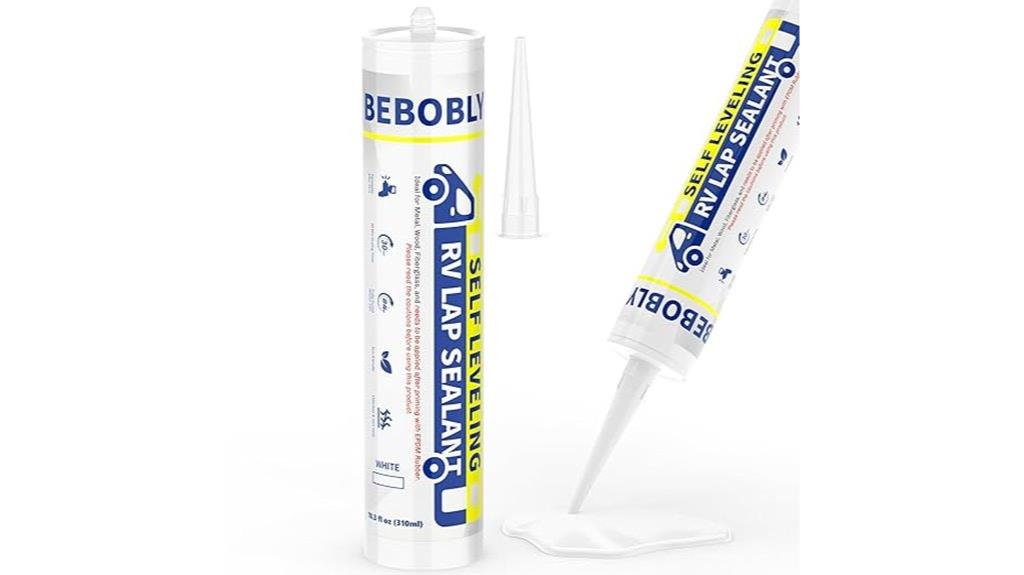
If you’re looking for a reliable sealant that’s easy to apply and provides a professional finish, RV Roof Sealant, Self-Leveling Lap Sealant White is an excellent choice. It’s waterproof, flexible, and designed specifically for RV roofs, making it perfect for sealing gaps and preventing leaks. Its self-leveling formula flows smoothly and skins within 15 minutes, ensuring a neat, even application. The sealant resists UV rays, extends roof lifespan, and maintains flexibility without cracking, even in heat. Users appreciate its ease of use, quick setup, and strong adhesion, making it a dependable solution for RV roof repairs and maintenance.
Best For: RV owners and repair professionals seeking an easy-to-apply, durable sealant for roof repairs that provides a professional finish.
Pros:
- Self-leveling formula for smooth, even application
- Strong waterproof seal with excellent UV resistance
- Flexible and non-cracking, suitable for various roof surfaces
Cons:
- Requires cleaning old sealant with alcohol for optimal adhesion
- Best applied in small sections to ensure proper coverage
- May need multiple coats for larger repairs
2 Pack RV Roof Sealant (10 oz) Self-Leveling Lap Caulk for Roof Leak Repair

The Pack RV Roof Sealant (10 oz) self-leveling lap caulk is an excellent choice for RV owners and DIY enthusiasts seeking a reliable solution for roof leak repair. It’s designed to be easy to apply on horizontal surfaces, filling cracks and seams smoothly without mess. Its waterproof, long-lasting seal protects against water infiltration, and its UV-resistant formula withstands harsh sun exposure, keeping flexibility over time. Compatible with various materials like EPDM, TPO, PVC, metal, and wood, it offers versatility for different RV roofs. The self-leveling feature ensures a professional finish, making it a dependable option for maintaining a watertight, durable roof.
Best For: RV owners and DIY enthusiasts seeking a durable, easy-to-apply sealant for roof leak repairs on various RV roofing materials.
Pros:
- Provides a waterproof, long-lasting seal that prevents water infiltration
- Self-leveling feature ensures a smooth, professional finish on horizontal surfaces
- Compatible with multiple materials such as EPDM, TPO, PVC, metal, and wood
Cons:
- Not an adhesive; may require additional products for certain sealing needs
- Can be less effective in very cold temperatures unless preheated or warmed
- Some users suggest alternative products like Sikaflex for certain sealing applications
Dicor 651SANSW-1 Non-Leveling Ultra Sealant System (10.1 Oz, White)
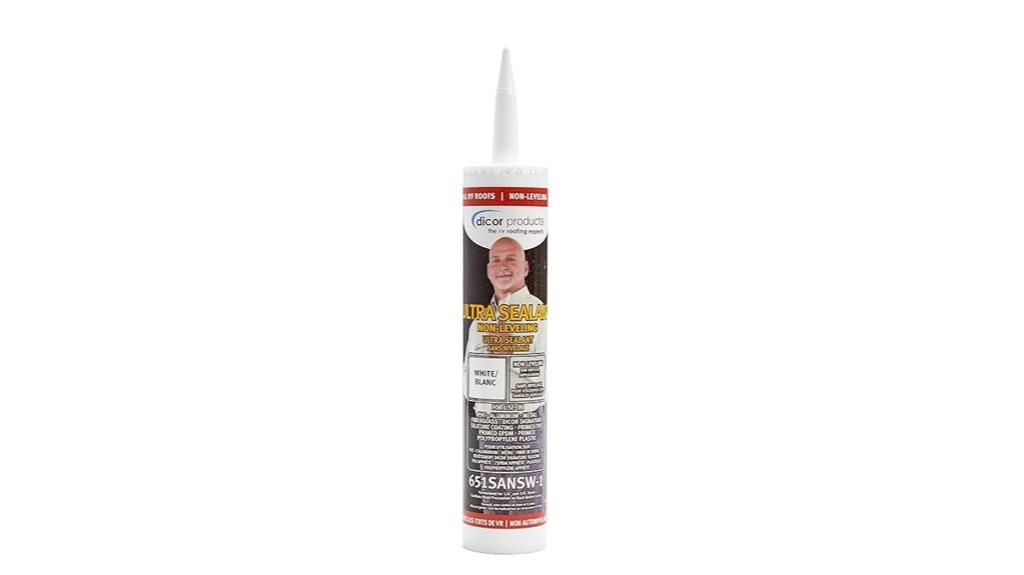
For those seeking a durable, weather-resistant sealant that adheres well to various RV roofing materials, Dicor 651SANSW-1 Non-Leveling Ultra Sealant System stands out as an excellent choice. This high-performance polyether sealant is perfect for sealing roof joints, edges, and accessories on RVs made of PVC, TPO, EPDM, metal, or fiberglass. It offers a watertight, flexible, and UV-resistant seal that won’t crack or shrink over time. Easy to apply, it cures quickly and maintains its elasticity through temperature fluctuations. Its white color provides a clean, professional look, making it ideal for both repairs and new installations.
Best For: RV owners and repair professionals seeking a durable, weather-resistant sealant for sealing roof joints, edges, and accessories on various roofing materials like PVC, TPO, EPDM, metal, and fiberglass.
Pros:
- High-performance, flexible, and UV-resistant sealant that prevents cracking and shrinking over time
- Compatible with multiple roofing materials for versatile use and reliable adhesion
- Easy to apply with quick curing, providing a professional-looking, watertight seal
Cons:
- Non-leveling, requiring careful application to avoid uneven results
- Sticky consistency may be challenging to work with and can require extra effort to smooth out
- Needs to be used with additional products like bonding adhesive or tape for optimal sealing and adhesion
Factors to Consider When Choosing Sealant for Van Roof Installs
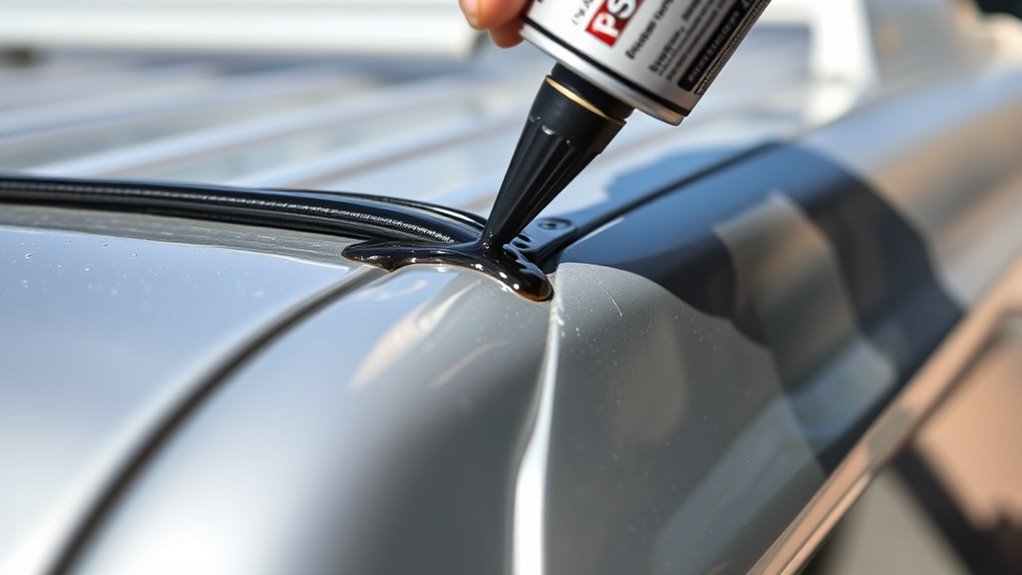
When selecting a sealant for your van roof, I consider factors like how well it sticks to the surface and its flexibility to handle movement. It’s also important to think about weather resistance and how easy it is to apply with control. Ultimately, I look for sealants that will last and withstand the elements over time.
Surface Compatibility and Adhesion
Choosing the right sealant for van roof installations hinges on guaranteeing compatibility with the specific roof material. I always check if the sealant bonds well with materials like EPDM, TPO, PVC, metal, or fiberglass to ensure effective adhesion. It’s also important to review the sealant’s adhesion strength, such as tensile or peel adhesion, to confirm it can handle environmental stresses. I verify whether it bonds to both smooth and textured surfaces, as some materials need specialized formulations for a secure grip. Additionally, I look for sealants that stay flexible and elastic after curing, allowing movement without cracking or losing adhesion. In the end, I guarantee it cures properly in different weather conditions to prevent leaks or bond failures, giving me peace of mind long-term.
Flexibility and Movement Absorption
Have you ever wondered how to guarantee a van roof sealant can handle the inevitable movement and temperature changes? The key is choosing a sealant with high elasticity. Sealants with a Shore A hardness around 20-30 can stretch and contract with roof shifts without cracking. They’re designed to accommodate natural expansion and contraction caused by temperature fluctuations, reducing the risk of leaks. Materials that stay elastic over time, even after prolonged UV and weather exposure, ensure ongoing movement absorption. Properly flexible sealants can handle vibrations and minor shifts, preventing stress cracks at seams and joints. Sealants with high elongation percentages—often over 200%—can stretch substantially without losing adhesion or integrity, making them ideal for dynamic van roof environments.
UV and Weather Resistance
Ensuring your van roof sealant can withstand the elements is just as important as its flexibility. UV resistance is essential because prolonged sun exposure can cause materials to degrade, crack, and lose adhesion. High-quality sealants often include UV inhibitors or stabilizers that protect against photo-oxidation and UV-induced brittleness, extending their lifespan. Weather resistance means the sealant must perform across a wide temperature range, typically from -40°F to 200°F, without losing flexibility or sealing ability. Exposure to moisture, temperature fluctuations, and UV rays can cause inferior sealants to crack, peel, or deteriorate, compromising the waterproof barrier. Choosing a sealant with strong UV and weather resistance ensures durability, reducing reapplication frequency and maintenance costs, and keeping your van dry and secure over time.
Application Ease and Control
When selecting a sealant for van roof installations, application ease and control are crucial factors that can make a significant difference in the quality of your work. A sealant with smooth, consistent viscosity allows for precise application, reducing mess and waste. Self-leveling formulas help create a flat, professional finish with minimal effort. Using a caulking gun with adjustable flow settings gives you better control over the amount and placement of sealant, ensuring a tidy job. Thinner, more flowable sealants are especially helpful on complex or uneven surfaces, making application smoother. Proper surface preparation and the right tools, like nozzles or applicators, further enhance control, helping you achieve a clean, effective seal. These factors simplify the process and improve your overall results.
Longevity and Durability
Selecting a sealant that lasts requires considering how well it resists UV rays, temperature changes, and environmental exposure over time. A durable sealant maintains its adhesion and flexibility for several years, often exceeding 5-10 years with proper application. Its formulation’s resistance to cracking, shrinking, or chalking directly impacts its lifespan. Sealants that form a flexible, waterproof membrane are less likely to fail prematurely, even with roof movement or vibration. Regular inspections and reapplications can further extend the sealant’s effective service life, helping prevent costly water damage down the line. Prioritizing longevity and durability guarantees your van roof stays protected, keeping you dry and secure for years to come. Choosing the right product now saves time and money later.
Sealant Type and Properties
Choosing the right sealant type and understanding its properties are vital steps in guaranteeing a reliable van roof installation. Different sealants, like self-leveling, non-leveling, or microsealants, suit various surface profiles and application needs. Key properties such as elasticity, UV resistance, waterproofing, and temperature tolerance determine how well the sealant performs over time. Sealants with high solids content and flexible elastomeric formulas tend to last longer and adapt to roof movements without cracking. Viscosity and flow characteristics influence how easily the sealant applies, fills gaps, and covers surfaces. Compatibility with roofing materials like EPDM, TPO, PVC, metal, or fiberglass is essential for proper adhesion and leak prevention. Selecting a sealant with the right type and properties guarantees a secure, durable roof seal.
Cost and Value Balance
Balancing cost and value is essential to guarantee you get a durable, effective sealant without overspending. I consider whether the sealant’s price matches its long-term performance, as higher-priced options often offer better UV resistance, elasticity, and lifespan. These qualities reduce the need for frequent reapplications, saving money over time. Cheaper sealants might seem appealing initially but can lead to costly repairs due to cracking, leaks, or premature failure. I also evaluate coverage area and ease of application, since some premium products provide faster, cleaner application and better adhesion, improving overall value. Investing in a quality sealant that prevents leaks and withstands environmental stressors may cost more upfront but proves more cost-effective in the long run, ensuring your van stays dry and secure without constant maintenance.
Environmental and Safety Factors
Ensuring safety and environmental responsibility when selecting a sealant is vital for protecting both your health and the planet. I recommend choosing low-VOC, non-toxic sealants to minimize harmful emissions during and after application, safeguarding humans, pets, and ecosystems. UV-resistant products are also essential, as sun exposure can break down less durable sealants and release toxins. Look for eco-friendly formulations that meet standards like ASTM or EPA certifications to ensure minimal ecological impact. Weatherproof and breathable sealants help prevent moisture buildup and mold without emitting harmful vapors. Finally, always follow safety instructions and proper disposal guidelines. Prioritizing these factors guarantees your van roof is sealed effectively while reducing health risks and environmental harm.
Frequently Asked Questions
Which Sealant Is Best for Extreme Weather Conditions?
I recommend using a high-quality, polyurethane-based sealant for extreme weather conditions. It’s flexible, durable, and resistant to UV rays, rain, snow, and temperature fluctuations. I’ve found that products like Sikaflex or 3M 5200 perform exceptionally well because they adhere strongly and maintain their integrity even in harsh environments. Applying this type of sealant guarantees your van’s roof stays watertight and secure, no matter what weather hits.
How Long Does a Typical Van Roof Sealant Last?
A good van roof sealant typically lasts between 5 to 10 years, but it really depends on the product and environmental conditions. I’ve seen some sealants maintain their integrity for almost a decade, while others might need reapplication sooner if exposed to harsh weather or frequent movement. To keep your van dry and secure, I recommend checking your sealant periodically and reapplying when you notice any cracks or leaks.
Can Sealants Be Applied in Cold or Rainy Weather?
Applying sealants in cold or rainy weather isn’t ideal. I recommend waiting for a dry, moderate temperature day to get the best adhesion and curing. Cold and moisture can prevent the sealant from setting properly, leading to leaks or reduced durability. If you must work in less-than-perfect conditions, choose a sealant formulated for such environments, but always follow the manufacturer’s instructions for ideal results.
Are There Eco-Friendly Sealant Options Available?
Yes, eco-friendly sealant options are available, and I recommend them for their reduced environmental impact. I’ve found products made with natural or biodegradable materials that work effectively while being safer for the planet. Look for labels like “green,” “biodegradable,” or “non-toxic.” These sealants provide strong adhesion and weather resistance without harmful chemicals, making them a smart choice if you’re environmentally conscious and want a sustainable solution for your van roof.
How Do I Select the Right Sealant for Different Roof Materials?
First, I focus on flexibility, adhesion, and weather resistance when selecting a sealant. For metal roofs, I choose silicone or polyurethane for superior sealing. For rubber or vinyl, I prefer butyl or specialized rubberized sealants. Wood roofs call for acrylic or latex options that expand and contract with the material. I always check the manufacturer’s recommendations, matching the sealant’s properties to the roof’s material to guarantee durability and a secure seal.
Conclusion
So, after all this talk about sealants, you’d think I’d have a clear favorite, right? Nope. Turns out, whether you pick a microsealant or a self-leveling option, the real trick is just keeping dry and secure—something even the best sealant can’t guarantee if you skip prep. Ironically, the most important part might be how you install it. So, choose wisely, because a good sealant is only as good as your application.
